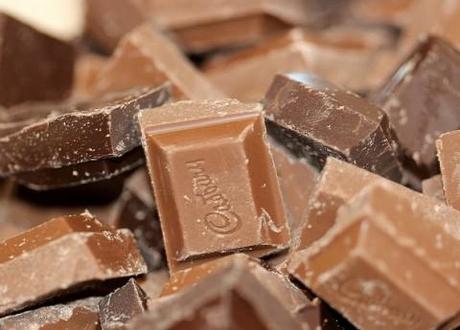
Could scoffing this really be good for you? Photo credit: peter pearson http://www.flickr.com/photos/peterpearson/2359015164/
A new study, conveniently published just before Easter, concludes that people who eat chocolate regularly have lower Body Mass Indexes (BMIs). But can we really get away with eating all the sugar and fat we know to be in most chocolate bars? Or should we stick to dark, high cacao varieties? Or should we just ignore these inconclusive studies and just enjoy life?
Regular chocolate consumption linked to lower BMI. Hailed by the Huffington Post as “the discovery every chocolate lover has been waiting for,” the findings of the study were published in the American Medical Association Journal’s Archives of Internal Medicine on Monday. Dr. Beatrice Golomb and her team from the University of California at San Diego “surveyed 1,018 men and women aged 20 to 85 years old about their weekly food intake. Those who reported that they ate chocolate more frequently had lower BMIs”, explained Jacque Wilson on CNN. The link remained even when other factors, like how much exercise individuals did, were taken into account, noted Michelle Roberts on the BBC.
Content counteracts calories? Dr Golomb said her findings suggested that “the composition of calories, not just the number of them, matters for determining their ultimate impact on weight,” reported the Huffington Post. Anahad O’Connor of New York Times said, “the researchers could not explain precisely why something usually loaded with sugar, fat and calories would have a beneficial effect on weight. But they suspect that antioxidants and other compounds in chocolate may deliver a metabolic boost that can offset its caloric downside.”
Skinny chocolate eaters? Well, not quite. The participants on the study had an average BMI of 28, reported the Huffington Post, so they weren’t exactly size 0 to begin with. And the data did link chocolate consumption with greater overall saturated fat intake.
Time to pig out on chocolate? Dr. Golomb told Anahad O’Connor of the New York Times that she had the idea for the study at an American Heart Association conference, after watching a nutritionist who studies chocolate gazing “forlornly” at a “lovely chocolate dessert cart.” However, these findings “should not be taken as a license to overindulge in chocolate eggs and bunnies this Easter” warned O’Connor, as it was “frequency of chocolate consumption — not the amount per serving — that had a beneficial effect on B.M.I.” “The study “does not mean that you can eat unbounded amounts of chocolate,” Golomb told Wilson of CNN. Eric Ding, from the Harvard Medical School in Boston advised: “If you consume chocolate, consume it in place of something else, rather than adding to your net daily calories (and) try to consume dark chocolate,” reported Genevra Pittman of Reuters.
Chocolate also good for mice. This is not the first study to talk up chocolate’s potential health benefits. Michelle Roberts explained on the BBC that “mice fed for 15 days with epicatechin (present in dark chocolate) had improved exercise performance and observable changes to their muscle composition.” Chocolate has also been “linked to a growing list of health benefits,” said O’Connor in the New York Times. Jacque Wilson added on CNN that “dark chocolate in particular is high in anti-oxidants and has anti-inflammatory properties” while a “2006 meta-analysis of studies published between 1966 and 2005 showed cocoa may even lower blood pressure, increase HDL (good cholesterol) and lower LDL (bad cholesterol). More recently, in 2011, researchers at the University of Cambridge analyzed the results of seven studies and concluded that high levels of chocolate consumption might be associated with a notable reduction in the risk of developing heart disease.”
Pay little attention. Louis Peitzman of Gawker reminded that “opinions on what’s healthy and what’s going to give you cancer tend to change from week to week,” and he questioned the value of BMI as a system for measuring health, adding that “some have dismissed it as total bullshit.”
The road of excess leads to the palace of wisdom? Jenny McCarthy quoted William Blake in the Telegraph as saying that “the road of excess leads to the palace of wisdom,” but insisted that “he meant occasional bursts of ecstatic hedonism, not sitting in front of Britain’s Got Talent steadily working your way through a deep-pan pizza, two bottles of wine and a family-size bar of Dairy Milk.”

